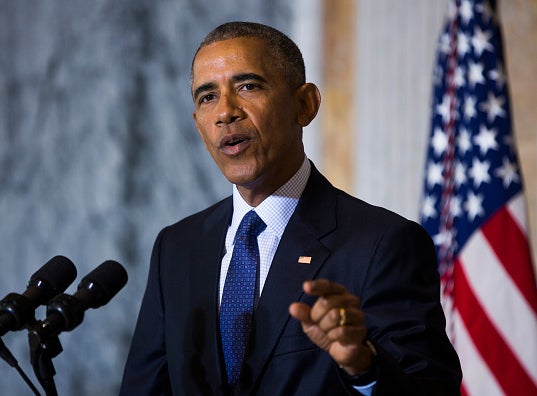
It’s been nearly three years since President Obama declared from the White House Press Briefing Room that he saw himself in Trayvon Martin.
“You know, when Trayvon Martin was first shot I said that this could have been my son. Another way of saying that is Trayvon Martin could have been me 35 years ago,” Obama said.
It was in that moment that the President sought to launch his legacy project, the My Brother’s Keeper Initiative, says Broderick Johnson, the assistant to the president and cabinet Secretary, and the Chair of the My Brother’s Keeper Task Force. During that speech and later with the launch of the initiative in February 2014, the president wanted the importance of caring for all youth, but particularly minority boys and young men, on the nation’s conscious.
Amber Rose Pens Heartfelt Post on Raising a Black Son
“There’s more that we can do, particularly for boys and young men of color to show that this country cares about them,” Johnson said at a White House briefing on My Brother’s Keeper last Wednesday. “And beyond those feel good elements, which are important, that the country is willing and should invest more in them.”
In the years since the program’s launch, more than 250 communities have accepted the My Brother’s Keeper Community Challenge, which calls on local and state governments to set aside resources to help young Black and brown boys get ahead. Though the initiative has seen the bulk of its financial support come from the private sector, with $600 million in grants and in-kind contributions helping to buoy the program, departments across the federal government have stepped up as well. The Departments of Education, Labor, and Justice have all taken broad steps to address educational gaps, provide job opportunities, and help divert young people from the criminal justice system and toward a more fruitful life path. The President himself has also been heavily involved with the program, having hosted a White House mentorship program of 40 D.C. area youths and helping to launch the My Brother’s Keeper Alliance, the nonprofit arm of the initiative.
Though President Obama’s time in office is coming to a close, Johnson said people inside and outside of the White House fully expect for him to continue working on behalf of young men and boys of color after his second term is over. “There’s no question that the president believes and we all believe that the President is making a difference with this work,” Johnson says. “We fully expect that he will continue to do that work.”
What’s more, Johnson says, the governmental programs implemented by the initiative have been multi-year, like the recently announced Second Chance Pell grant pilot program which helps link some 12,000 inmates to secondary education via 67 colleges and universities. That will likely ensure that the President’s work continues from within the government after he leaves office.
We Need to Examine How NYC Schools Handles Sexual Assault Cases of Black Girls
A bulk of the initiative’s efforts fall on the shoulders of local community leaders like Columbia, South Carolina Mayor Stephen Benjamin who sat in on the briefing with White House Senior Advisor Valerie Jarrett. Benjamin, commenting on the shooting of Alton Sterling in Baton Rouge, La., said that My Brother’s Keeper has in many ways provided a table at which members of the community and police can come together to build up their often troubled relationship. During the briefing, the Department of Justice announced officials from the Eastern District of Louisiana would open a civil rights investigation into Sterling’s death. “There’s a direct connection between efforts to prevent youth violence and making sure we develop and maintain a strong, healthy relationship [between communities and police],” Benjamin said last Wednesday.
And given that My Brother’s Keeper was launched in the wake of anger and angst stirred by the death of Trayvon Martin, Johnson said that the impact of the program on the issues that fuel such angst—hopefully—is laying the groundwork for a more morally and economically just society.
“It’s as simple as making sure that nation sees we have a responsibility to invest in all people in this country.
